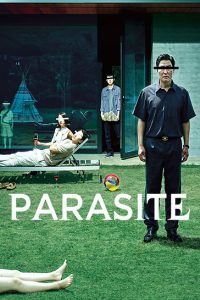 This incredibly well-made movie by Bong Joon-Ho broke the rules by being the first ever non-English (“foreign”) film to win the Academy Award for Best Picture. Parasite also earned Best Director, Best Original Screenplay, and Best International Feature Film. There are so many layers in this carefully crafted film that I am still peeling back after my second time watching. There are already many thoughtful analyses of this film (such as this or this or this), so I will mainly write to highlight some of my favorite parts of this movie. The film is so skillfully suspenseful, so if you care about spoilers, enjoy watching the movie first before reading.
This incredibly well-made movie by Bong Joon-Ho broke the rules by being the first ever non-English (“foreign”) film to win the Academy Award for Best Picture. Parasite also earned Best Director, Best Original Screenplay, and Best International Feature Film. There are so many layers in this carefully crafted film that I am still peeling back after my second time watching. There are already many thoughtful analyses of this film (such as this or this or this), so I will mainly write to highlight some of my favorite parts of this movie. The film is so skillfully suspenseful, so if you care about spoilers, enjoy watching the movie first before reading.
Through so many little moments and details, this film illustrates extreme wealth disparity and how much working people are pitted against each other to fight over the limited resources they have access to. The working-class Kim family seizes on any and every opportunity to take someone else’s job—from the pizza delivery person, to the driver, to the housekeeper. The son Ki-woo even moves in on his best friend’s love interest when given the opportunity. In the final scene, Ki-woo dreams of when he is *at last* rich and can do what he wants. He says he has a plan, and his plan is basically to get money and finally *make it* (aka this is the, “We are all just temporarily embarrassed millionaires,” sentiment that upholds the American Dream myth in the U.S.). We see a side-by-side contrast of how well-fed and cared for the little high-maintenance pet dogs are, compared to whole neighborhoods in Seoul that get flooded with sewer water.  It is a striking scene when the Kims have to cross through the whole city in the pouring rain and we see the socioeconomic changes in the city. Again we see how people in need are pitted against each other when neighbors refuse to help each other while their homes are flooded.
It is a striking scene when the Kims have to cross through the whole city in the pouring rain and we see the socioeconomic changes in the city. Again we see how people in need are pitted against each other when neighbors refuse to help each other while their homes are flooded.
There are glimmers of self-awareness of this unfortunate competition between working people. In a moment of hesitation, the Kims remind each other that they have no choice but to only worry about themselves in this dog-eat-dog world. The original housekeeper, Moon-gwang, initially reaches out to the Kim family in a gesture of solidarity as a “fellow needy” working person (she and her husband are among the many poor people who have fell suspect to loan sharks), but when the Kims reject the gesture, Moon-gwang does not hesitate to blackmail them. Chung-sook (the mother of the Kim family who swoops in for Moon-gwang’s job) literally ruthlessly kicks Moon-gwang down the stairs. In another scene, in response to a comment about how nice Mrs. Park is, Chung-sook says, “She is nice because she is rich. If I was this rich, I’d be nice too.”
There are also many moments that are made to make you cringe when someone says something about people who are poor that maybe feels too familiar, perhaps something you have heard someone you know say before. The wealthy Park family is strangely fascinated by the drugs and dirty habits they imagine poor people do. Mr. Park is disgusted by a smell he associates with the subway (aka working people who rely on public transit). We see how these judgments are even deeply ingrained in the Kims, when Ki-woo says things like, “Why would they hire a loser like me? I’m not a college student and just did the military,” even though he is an incredible writer. Ki-taek (the father in the Kim family) has so many useful skills that he acquired from all the various jobs he has worked, yet he still feels a shame about his so-called “subway smell” that he can’t get over. 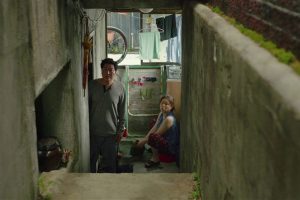 When the Kims first discover Moon-gwang’s husband living in the basement, they exclaim thick with judgment, “How can you live in a place like this?” even though they also live mostly underground in their semi-basement apartment and Mr. Kim literally ends up living down there in the end. Like Jordan Peele’s Us, there is a lot of symbolism around life above or below ground.
When the Kims first discover Moon-gwang’s husband living in the basement, they exclaim thick with judgment, “How can you live in a place like this?” even though they also live mostly underground in their semi-basement apartment and Mr. Kim literally ends up living down there in the end. Like Jordan Peele’s Us, there is a lot of symbolism around life above or below ground.
Meanwhile, Mr. Park admits that his wife has “no skills as a housewife” and is totally unable to maintain their fancy home or feed the family without paid help. Even the “motion-activated” lights that seem like a fancy feature of the fancy house turn out to be literally and painstakingly manually powered by people who work for them.
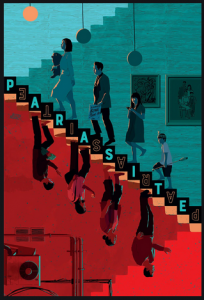 As the Kim family weaves themselves into the Parks’ home, they are able to find the balance between being refined enough to keep the Parks comfortable—well-dressed, well-educated and credentialed, courteous—while never “crossing the line” by being too comfortable or considering themselves equal. (The Parks, after all, want to enjoy cheap instant noodles, but expect that expensive sirloin be in it.) Mrs. Park sweetly reminds her employees that they are “getting paid extra today” so can’t complain about the work they are being asked to do. Ki-Jung (“Jessica”) enforces the hierarchy by saying “the help” cannot enter during one of her art therapy sessions.
As the Kim family weaves themselves into the Parks’ home, they are able to find the balance between being refined enough to keep the Parks comfortable—well-dressed, well-educated and credentialed, courteous—while never “crossing the line” by being too comfortable or considering themselves equal. (The Parks, after all, want to enjoy cheap instant noodles, but expect that expensive sirloin be in it.) Mrs. Park sweetly reminds her employees that they are “getting paid extra today” so can’t complain about the work they are being asked to do. Ki-Jung (“Jessica”) enforces the hierarchy by saying “the help” cannot enter during one of her art therapy sessions.
And despite everything that happens in this film and how the Parks treat the people who work for them, both Ki-taek and Moon-gwang’s husband have a complex sense of loyalty to and even defend the Park family. While living in the basement, they pay their respect to Mr. Park and apologize to him for their behavior.
I also love that this film won the most prestigious award in the United States for films while there are several moments throughout the film making fun of a ridiculous prestige given to anything “American.” Ki-Jung goes by her “American name” Jessica from her time studying in Illinois (the idea of name-dropping a “flyover state” like Illinois to show prestige is amusing). The young son Da-song has a fascination with camping and dressing up in problematic “Indian” costumes (both American traditions still very much alive today), 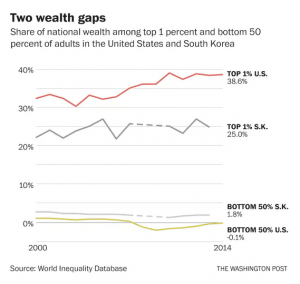 and the parents plan an “American” themed party for his birthday. Mrs. Park makes a comment about something being, “Made in America so it must be reliable,” when those in the United States know that a majority of our manufacturing comes from overseas. While this movie is making a statement about wealth disparity in South Korea, it is undeniable that the wealth disparity of the U.S. is much worse.
and the parents plan an “American” themed party for his birthday. Mrs. Park makes a comment about something being, “Made in America so it must be reliable,” when those in the United States know that a majority of our manufacturing comes from overseas. While this movie is making a statement about wealth disparity in South Korea, it is undeniable that the wealth disparity of the U.S. is much worse.
Beyond the powerful imagery and social commentary, there are so many moments of clever writing that I did not get to fully appreciate until the second time watching. There is the comment Mr. Park makes about how good of a worker Moon-gwang is, but her flaw is that she seems to “eat for two,” which seems like just a casually misogynist comment to again make us cringe, but is also a foreshadowing. The final murder scene brings it all full circle. Moon-gwang’s husband yells “RESPECT” (what better way to pay respect to the Parks than dropping some English in your final act as a class traitor?) as he tries to save Mr. Park. And then Mr. Park—despite all the commotion—can’t help but plug his nose from the horrid “Subway Smell.”
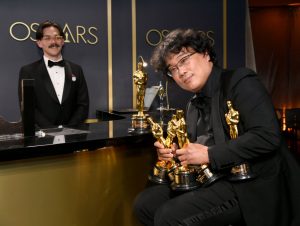 I think all of the Academy Awards earned are very well-deserved. The movie is suspenseful and unexpected, clever and entertaining, and a mourning of a solidarity that could be but tragically isn’t. I’m sure there will other layers to notice next time I watch it.
I think all of the Academy Awards earned are very well-deserved. The movie is suspenseful and unexpected, clever and entertaining, and a mourning of a solidarity that could be but tragically isn’t. I’m sure there will other layers to notice next time I watch it.
